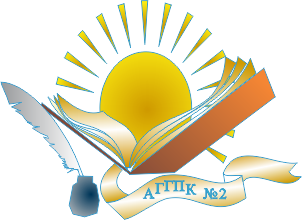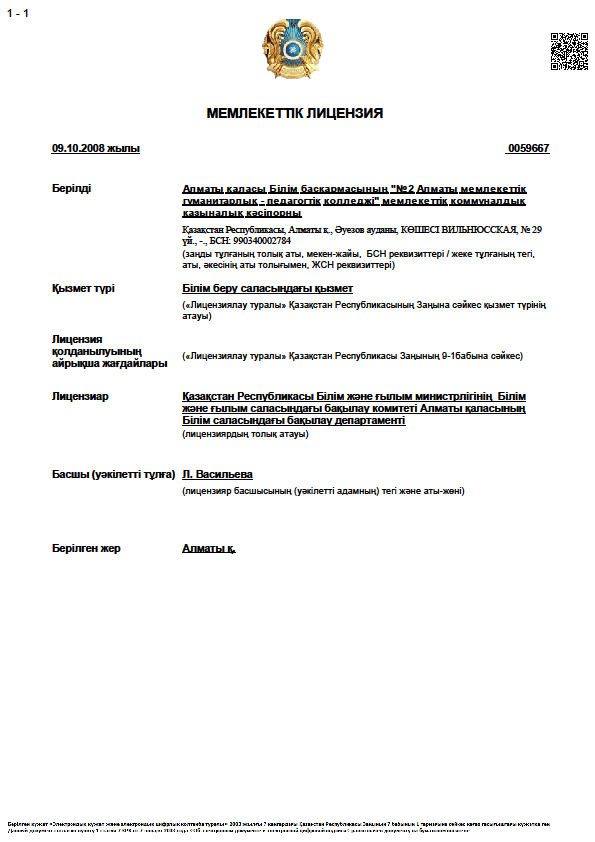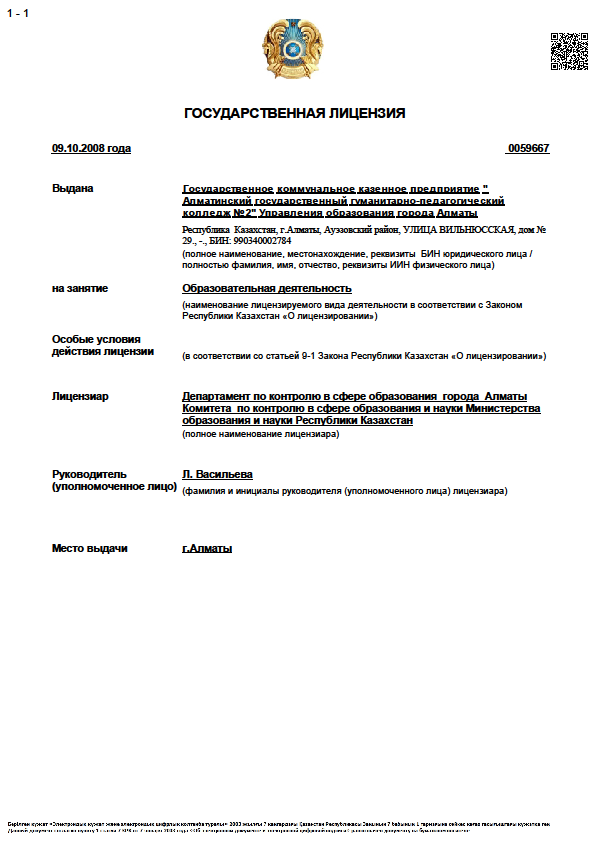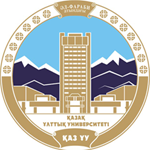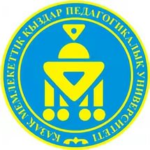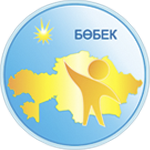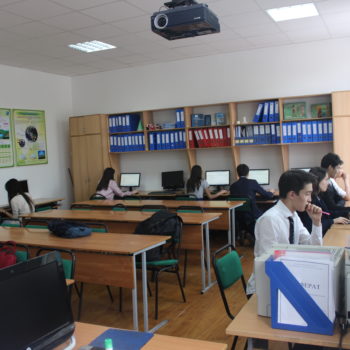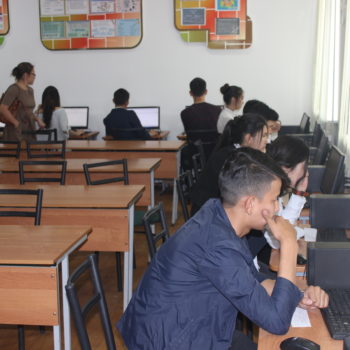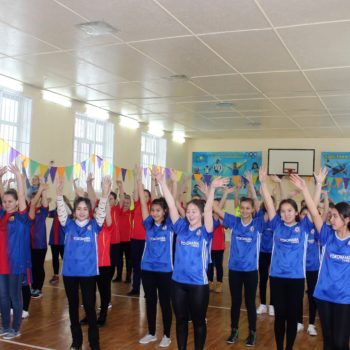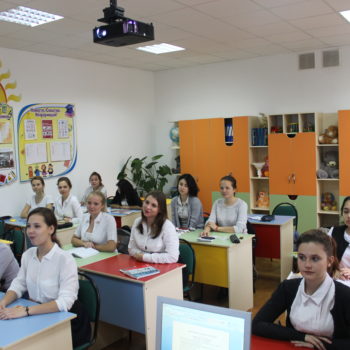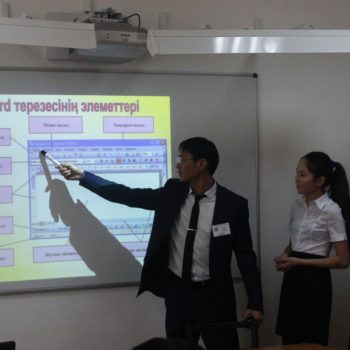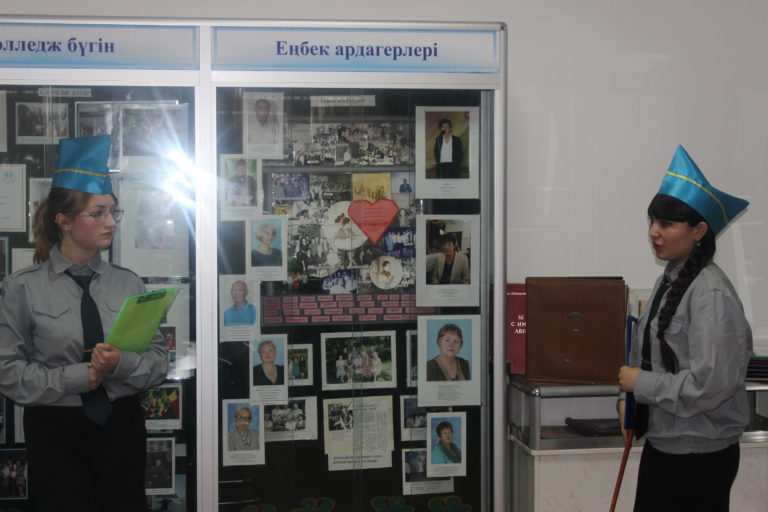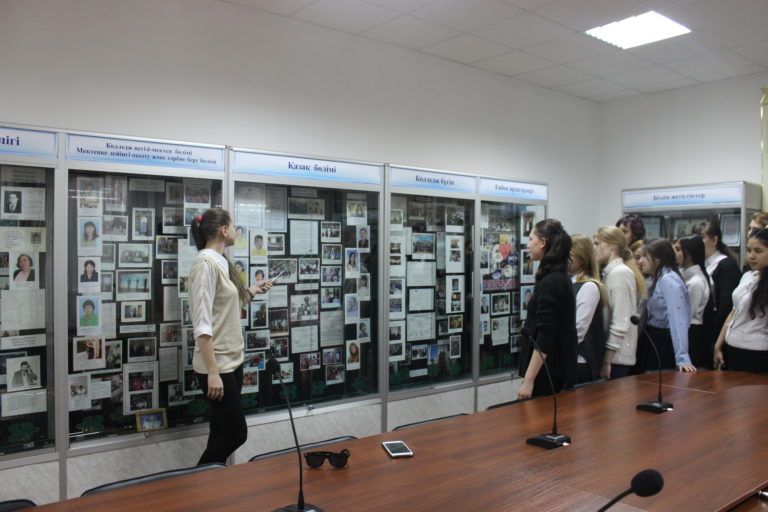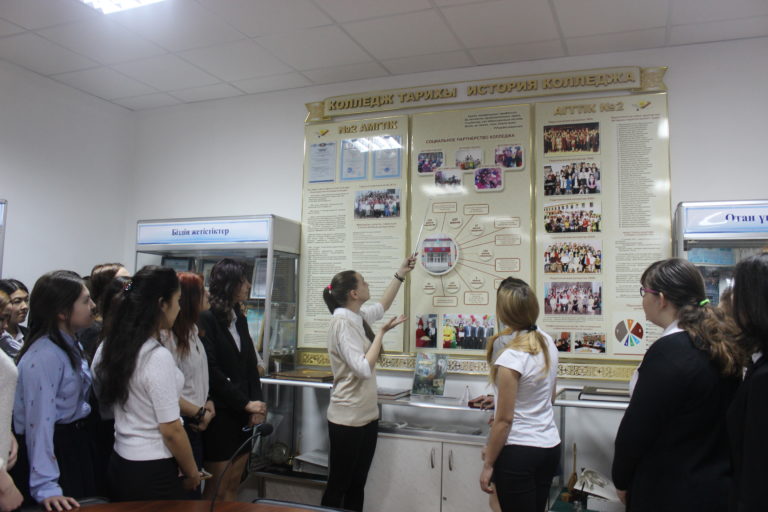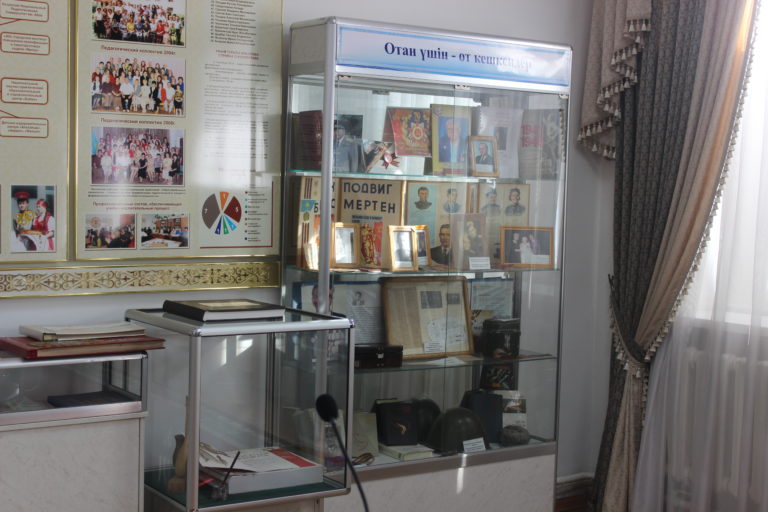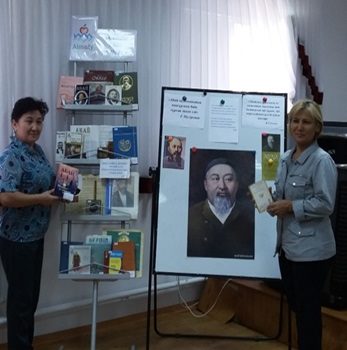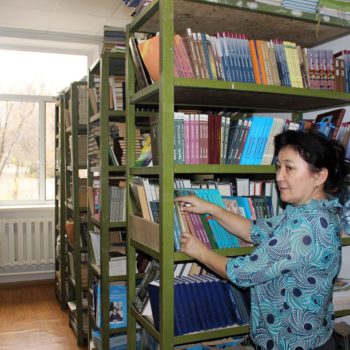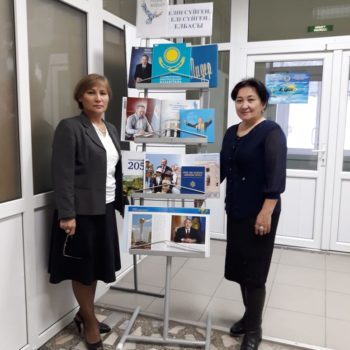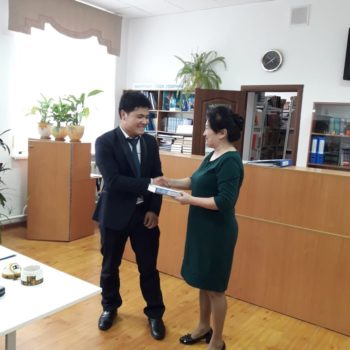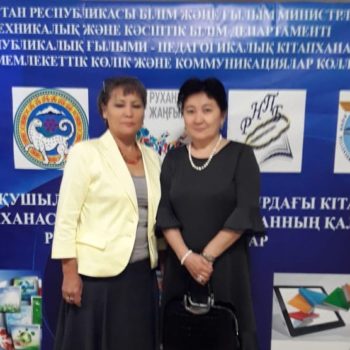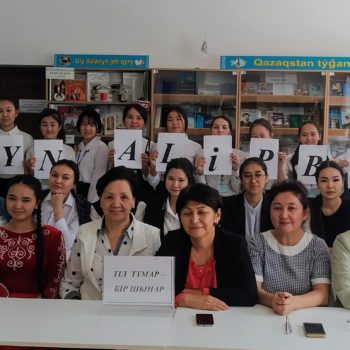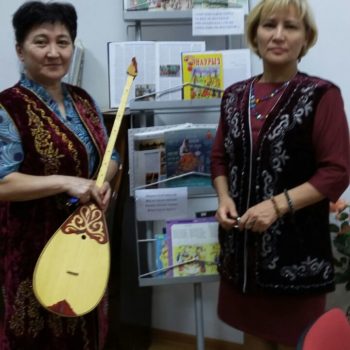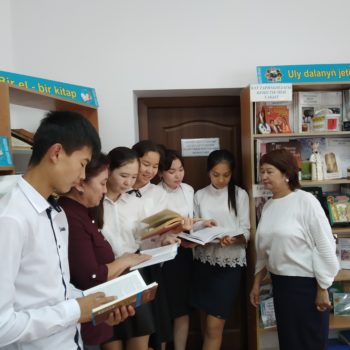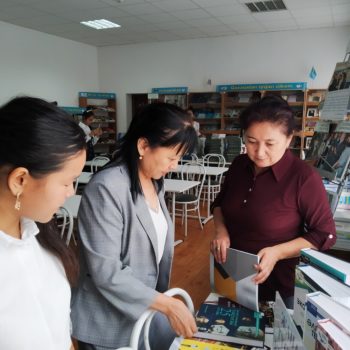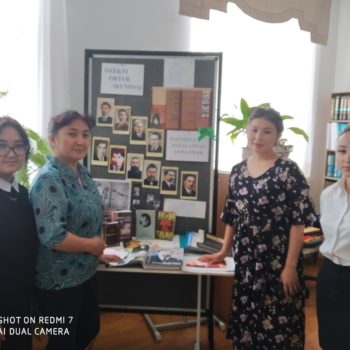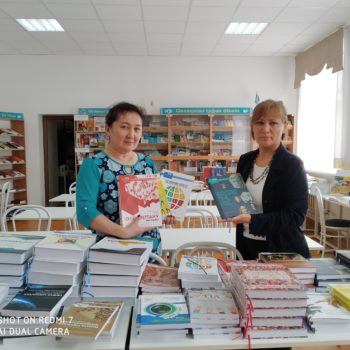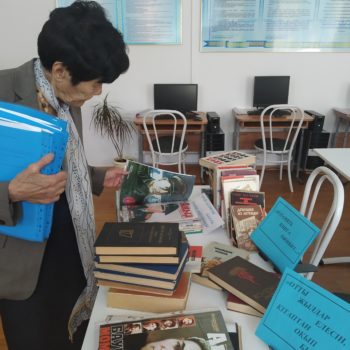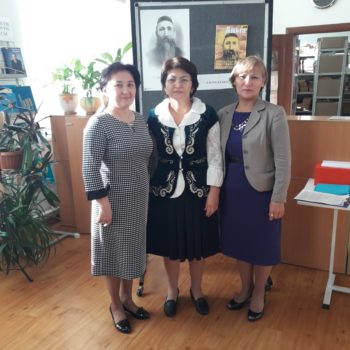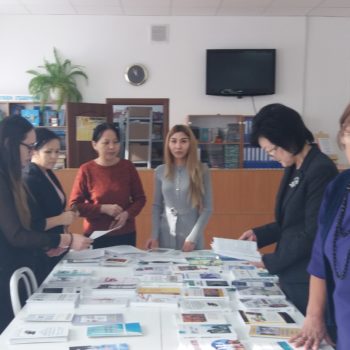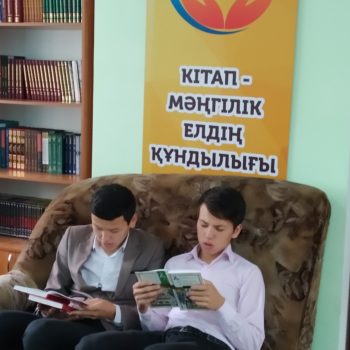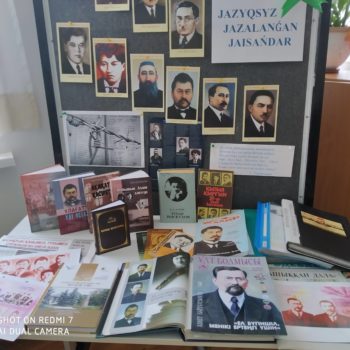
About college
General characteristic of an educational institution
Status of educational institution

State utility company «Almaty State Humanitarian and Pedagogical College №2» — a state budgetary educational institution of secondary specialized vocational education, is a legal entity subordinate to the Department of Education of Almaty, the Ministry of Education and Science of the Republic of Kazakhstan.
The founder, in accordance with the current legislation of the Republic of Kazakhstan, is the Akimat of the city of Almaty
The college carries out educational activities on the basis of the state license AA-5 series No. 0059667 dated 09.10.2008, issued by the Department of Economics and Budget Planning of the city of Almaty (validity period is not limited).
In its activities, the college is guided by the Law of the Republic of Kazakhstan «On Education», the Standard Rules for the Activities of Technical and Vocational Education Organizations (approved by the Government of the Republic of Kazakhstan dated May 17, 2013 No. 499), orders of the Ministry of Education and Science of the Republic of Kazakhstan, the Charter of the College, the Concept for the Development of the Almaty State Humanities and Pedagogical College No. 2 for the period 2016-2020, College development strategy, decisions of the College Pedagogical Council.
The main tasks for the 2020-2021 academic year:

- to study the regulations governing the transition of educational institutions of TVE to academic independence;
- to begin work on the introduction of credit-modular technology;
- to study the mechanism of transition to the accumulative system of loans, the introduction of a point-rating system for assessing the accounting of educational achievements of students;
- to intensify the scientific and methodological work of college teachers to develop educational and methodological materials;
- create digital content for distance learning;
- to ensure the participation of college students in the regional and international WorldSkills championships in the competencies «Preschool education and training» and «Primary education»;
- to continue the work of the “Ustaz” trade union committee to protect the rights and interests of workers, to increase the prestige of the teacher, to improve the conditions for their work and rest;
- to search for new approaches to the organization of vocational guidance work for teachers and students to attract applicants to pedagogical specialties;
- to continue work on the implementation of the Rukhani Zhangyru program;
- continue to work within the educational cluster of Almaty and international cooperation in the field of education.
The priorities of the Pedagogical College for the academic year 2020-2021 are as follows:

- Further improvement of the College’s educational process.
- Improve the quality of education through monitoring, diagnostics of educational results, implementation of programs developed on the basis of credit-modular technology.
- Improvement of educational approaches in distance learning.
- Development and improvement of IT competences of teachers.
- Improving the activities of the educational cluster for training, retraining, advanced training and certification of personnel with a coordination training center on the basis of AGGPK No. 2.
- Improving the scientific and methodological activities of the college for the translation of the pedagogical experience of teachers, the organization of research activities of students.
- Improving the quality of human capital in the context of modernization of educational work.
- Improving the activities of the college as the basic organization of TVE for the integration of the subject of the NLO «Self-knowledge» into the educational space.
- Further digitalization of the educational environment of the college.
Conceptual goals:

- modernization of professional pedagogical education in accordance with the needs of society and industrial and innovative development of the economy, integration into the global educational space;
- increasing the prestige of the teaching profession;
- the formation of students’ active civic position, social responsibility, a sense of patriotism, high moral and leadership qualities.
The mission of college

«We are preparing the best teachers for children of Kazakhstan!»
Vision

To become one of the leading educational organizations in Kazakhstan in the field of training competent specialists, which has a high image in society and the international educational space.
Purpose

training qualified specialists in the context of updating content of education.
Educational management system

The College is administered in accordance with the Education Act of the Republic of Kazakhstan
The main purpose of educational work is to provide quality education and create conditions for the formation of professional competence and citizenship.
The college director manages the educational process. The highest self-government body of the college is the general meeting of the labor collective, which is endowed with the functions of determining the general strategic and tactical directions of the institution’s activities, decides the most important life issues, carries out general management of the college’s activities, and performs the functions of protecting the rights and interests.
The College has a number of advisory bodies that ensure collegial decision-making in the areas of teaching methods, research and education: a pedagogical council; a trade union; a training and methodological council; and methodological association of tutors.
Competences and management are determined by local acts and the Charter of the college. The functions of each structure are defined, powers are delegated from the head of the college to subject-methodological commissions and departments, teachers and students; social partners are involved . With the development of state and public administration, the range of issues related to the competence of public administration bodies has expanded.
The rights and obligations of administrative and managerial personnel, college employees are determined by job descriptions.
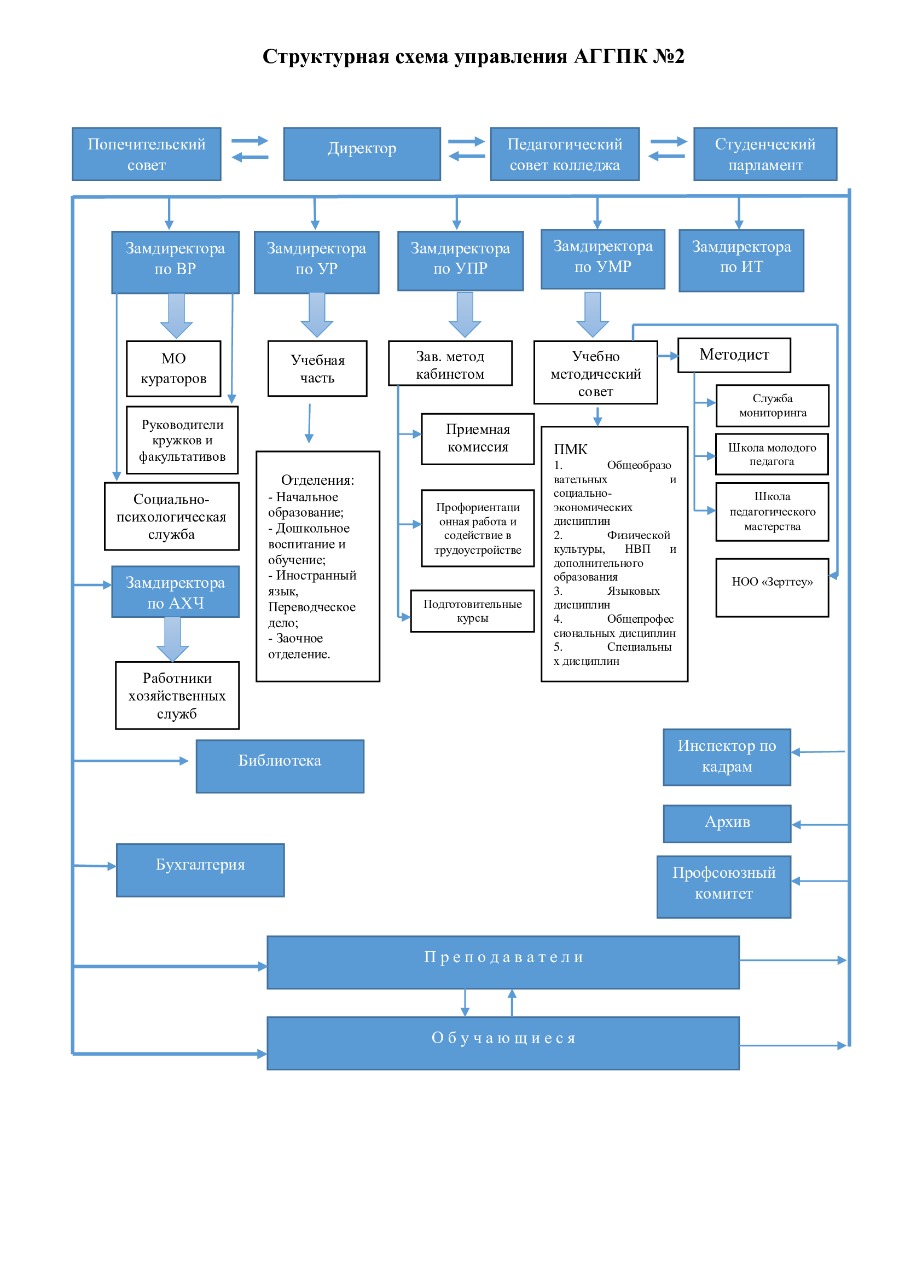
Material and technical base

The college has a modern material and technical base, which provides all the conditions for education and upbringing purposes.
The technical equipment of the college includes:
- 21 classrooms;
- choreographic hall;
- gym;
- conference hall;
- 7 computer classes;
- 1 language classroom;
- Self-knowledge classroom;
- A classroom of fine and applied arts;
- library and a reading room for 48 seats with a book fund of more than 52,000 units
- welsh dresser for teachers and students for 25 seats

Professional staff


Qualitative structure of the teaching staff

The educational process of the college is carried out by 63 qualified full-time teachers. 47 teachers have the highest and first category of qualification.
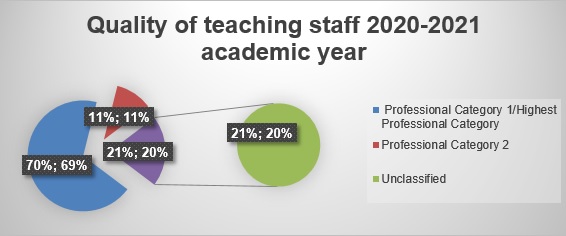
Honorary title «Excellence in Education» has 6 teachers.
The badge «Honorary Worker of Education of the Republic of Kazakhstan» was awarded to 2 teachers. 1 teacher is a candidate of pedagogical sciences.
Undergraduate — 8 people.
Scientific and methodical work

In college one of the collegiate management bodies, along with the pedagogical council, is the methodical council, which provides methodological support for the educational process and coordinates the work to improve the scientific and methodological potential of the teaching staff.
The Council consists of the heads of subject-methodological commissions, methodologists, deputy directors of the college, experienced teachers.
The main tasks of the educational-methodical council are:
— organization of monitoring of the quality of methodological support of the educational process;
— planning, organization of expertise and recommendation for the publication of educational, educational-methodical and scientific-methodical literature, manuals and other materials;
— generalization and dissemination of pedagogical experience of college teachers
— organization of work on raising the qualification, retraining and attestation of teaching staff;
— the organization of work of creative groups among teachers of the college on the development of education and the formation of priority directions in its implementation;
— consideration of the introduction of various forms of methodical work aimed at improving the teaching and educational process and providing practical assistance to teachers;
— consideration and approval of programs of elective disciplines;
— organization and conduct of seminars, conferences, meetings on improving educational-methodological and scientific-methodological work.
One of the active forms of increasing the pedagogical skill is the activity of methodological commissions. The work of the subject-methodical commissions is carried out in accordance with the Provisions on the SMC and ensures the personal development of the teacher, contributes to the creation of conditions for self-education and professional development, coordinates the active participation of the college teachers in the pedagogical educational space of the city and the republic. All teachers of the college are united in 8 SMC:
- SMC of Kazakh language and literature
- SMC of Russian language and literature
- SMC of general professional disciplines
- SMC of special disciplines
- SMC of general educational disciplines
- SMC of English language
- SMC of physical education and basic military training
- SMC of socio-economic disciplines
An obligatory condition for ensuring a high quality of education is the teacher’s professional development. In the college all conditions for systematic professional development are created. Further training for teachers is provided through refresher courses, participation in local, regional seminars, conferences, other interactive forms, as well as pedagogical intercollege readings, trainings and councils, professional seminars, in the framework of industrial studies.
The main forms of professional development are: advanced training courses, visits and analysis of open lessons, training seminars for teachers.
The traditional bases for upgrading the qualifications of the teaching staff of the college are: NJSC ‘Kasipkor holding company”, ‘City scientific and methodological center of new technologies and education», JC NCIG «Orleu » Almaty c., NNPHEC “Bobek” and other institutions.
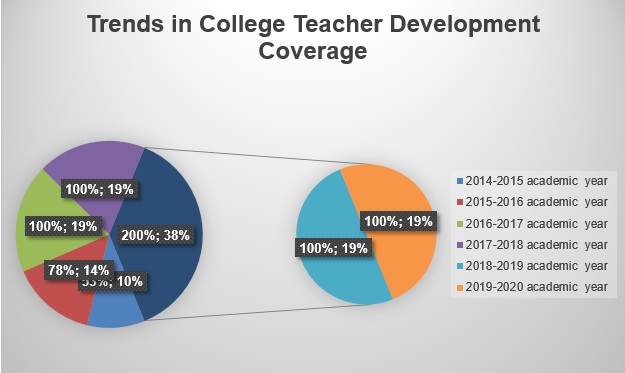
Rating evaluation of the activity of the SMC and the teachers of the college

The college conducts work on the rating evaluation of the professional activities of subject-methodological commissions and teachers. The rating evaluation of the activity of the SMC and the teachers of the college for the year is an important component of the strategic management of the college.
The college conducts work on the rating evaluation of the professional activities of subject-methodological commissions and teachers. The rating evaluation of the activity of the SMC and the teachers of the college for the year is an important component of the strategic management of the college.
It allows you to evaluate and compare the results of the performance of teachers in terms of indicators that characterize the educational, scientific, methodological, practical and educational work.
Obtaining the results of the rating assessment allows each teacher to objectively assess their work in the past year, determine the low-cost areas in any area of their activities and, taking this into account, plan their work properly for the next year.
Such an assessment positively affects the aspiration of teachers to improve their qualifications, professionalism, the growth of pedagogical skills, and this, in turn, contributes to improving the quality of training future specialists in education and the rankings of the college.
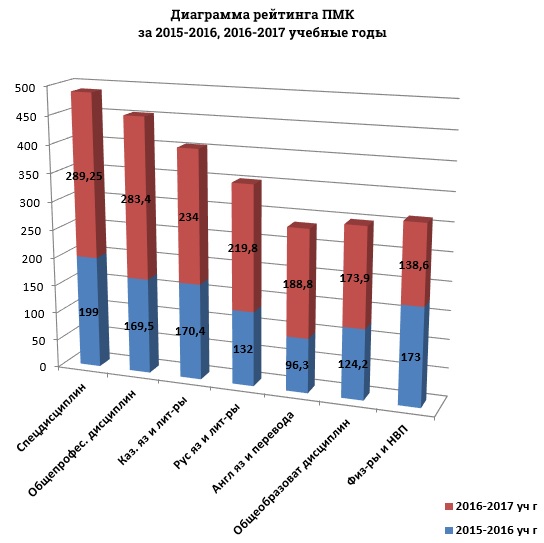
College history museum
Centre of patriotic education of students

Since the foundation of the college there is a museum of college history. It accumulates materials, documents, items reflecting the history of the creation of the college, its development and achievements.
From 1980 to the present day the museum reflects the famous events of the educational institution: the contribution and achievements of managers, teachers, graduates, who played a huge role in the development of the college.
The aim of museum is to create conditions for the development of the personality by including it in the manifold activity of the museum. The museum organizes excursions for students for the purpose of patriotic education, professional continuity and for schoolchildren in the vocational guidance work.

Library

GENERAL INFORMATION ABOUT COLLEGE LIBRARY
The library is located in Almaty, Taugul-2 micro district, building No29 / 3,
GKKP GU «Almaty State Humanitarian and Pedagogical College №2»
Library Web Page Address: http: //saltun1967.wi[Site.com/addpk lidrare
Certificate about the entry of the library of AGGPK №2 in the membership of the KBS Kazakhstan Library Union October 2020 Registration No. 89 of 23.10.2020 Associated Member: IFLA, BAE
THE LIBRARY OF GKPU GU «ALMATY STATE HUMANITARIAN PEDAGOGICAL COLLEGE NO. 2» WAS FORMED IN 1980.
The college counts its history since 1980. Almaty Pedagogical School No. 2 was created by the decision of the Board of the Ministry of Education of the Republic of Kazakhstan (Order No. 120 of August 15, 80), and it was reorganized into a pedagogical college in August 1993. 2008 GKPP «Almaty Pedagogical College No. 2» was renamed GKKP GU «Almaty State Humanitarian Pedagogical College №2».
Information and Communication Center — (hereinafter referred to as the library) organizes its work towards the «Informatisation of the College Library Activities». The library is located on the second floor of the college, takes an isolated room. The total area of the library is 90.0 square meters. m (of which 54 sq. M. m., Reading room for 48 seats and 36 sq.m. for storing the educational fund).
Library staff: 2 people
Library Head: Suleimenova Altynkul Ashimovna — Total experience of library work is 29.7 years, in this educational institution: 8.7 years
The librarian: Arttykbaeva Risdyk Mazakbaevna, with experience of library work for 27.7 years, In this educational institution: 4.7 years
COLLEGE LIBRARY GOALS
The objectives of the college library correlate with the objectives of the educational institution:
• formation of a general culture of the personality of students based on the assimilation
of a mandatory minimum content of general education programs, their adaptation to
life in a policultural society;
• creation of a basis for a conscious choice, the preparation of competitive graduates
who are ready for work in schools and to a successful continuation of education in
higher educational institutions;
• education of citizenship, patriotism, tolerance, respect for the fundamental rights and
freedom, different cultures and languages, hard work, love of the environment,
family;
• formation of a healthy lifestyle;
THE MAIN TASKS OF THE LIBRARY:
• Implementation of public policy in the field of education through library-information
services of users, ensuring their equal rights, free use of library and information
resources guaranteed by the state.
• creation of a single information and educational space of college; Organizing
comprehensive library and information services for all categories of users, ensuring
their free and secure access to information, knowledge, ideas, cultural values.
• Education of civil identity, assistance in the socialization of students, the
development of their creative abilities.
• Promoting the formation of information competence of students.
• Organization of systematic reading of students and leisure in the conditions of the
library, taking into account the interests, needs, age-related psychophysical, national
characteristics of students.
• Improving the nomenclature of the library of services based on the introduction of
new information technologies, making library information processes electronic,
organizing a comfortable library environment, education of the information culture
of teachers and students.
THE MAIN FUNCTIONS OF THE LIBRARY
• The accumulating — library forms; accumulates, systematizes and stores library
information resources.
• The service — library provides information on available library and information
resources, organizes the search and issuance of library information resources,
provides access to remote sources of information.
• Methodical — library develops educational and methodological materials on the basics
of user information culture, algorithms and information search technology.
• Training — the library organizes trainings on the basic information culture for various
categories of users.
• Educational — the library introduces students to the treasures of world and local
culture.
• Educational — the library contributes to the development of a sense of patriotism
towards the state, and region.
• Social — library contributes to the development of user ability to self-education and
adaptation in modern information society.
• Coordinating — the library coordinates its activities with other libraries, libraries for
more complete satisfaction of users’ needs in documents and information.
AVAILABILITY OF LIBRARY DOCUMENTATION
• Library Regulations
• Rules for using the library
• Journal instruction head of library
• Job descriptions of library staff
• The annual work plan of the library
• Annual Library Report
• Folder with regulatory documents of library
AVAILABILITY OF REPORTING LIBRARY DOCUMENTATION
• Book of Total Library Fund
• Inventory books
• Notebook of publications that are not subject to entries in the inventory book
• Notebook of books count and other documents received from the reader instead of
lost books
• Folder with copies of accounts and invoices for the delivery of basic literature
• Library Motion Acts Folders
• Acts of inventory and checks of the library fund
• Library work diary
• Journal of Library Information
• Statistical report on the security of educational literature on disciplines
STATEMENT FROM THE RULES OF THE LIBRARY
• All college students can be readers (users) of the library.
• The reader has the right to use the Book Foundation, the reference and library
equipment, Internet resources
• The reader can receive up to 5 books for up to 10 days.
• Exchange of printing and CDs, work with reference materials, Internet access is made
according to the work schedule installed by the library.
GROUP WORK
• Conduct thematic library lessons
• Organization of contests and quizzes among readers
• Preparation and conducting oral journals
• Creation and organization of viewing of commercials in the library room
• Inform readers about new arrivals in the library
EXHIBITION WORK
• Book exhibitions
• Registration of information stands
• Organization of thematic and age collections of books
• Organization of exhibitions of creative student works
INDIVIDUAL WORK WITH USERS The library assists readers in the selection of information, in the design of their creative works, consults on the rules for using the library, and organizes work on the use of Internet resources.
The library conducts work with readers for the preservation of books and textbooks, informs teachers about the presence of textbooks and replace books and textbooks lost by readers.
The library users have the ability to use copying equipment.
THE MAIN INDICATORS OF THE WORK OF THE LIBRARY FOR 2020
• General Fund — 46106 copies
Including in the Kazakh language: 9134 copies; 20 %
in Russian: 34831 cop.; 75.5%
in other languages 2141 copies; 4.6%
• Library Training Fund: 26629 copies.
• Documents on non-traditional media (CD-ROM, audio, electronic books PDF) video documentation): 657 copies.
• Alignment of the Library Fund in accordance with BBK
• Number of readers — 973
By category (person)
— Students: 898
— Teachers: 65
— Others: 10
Total number of visits: 1202
Total Number of /readers: 6305
Relative Indicators:
Attendance (to-in visits / to readers): 14
Readability (providing books to readers): 56
Foundation turnover (providing books to readers/ foundation): 1
Security (fund / to readers): 53.7
INFORMATION AND COMMUNICATION CENTERWorks from 08:00 to 18:00 h.
Saturday from 08:00 – 13:00 h.
Methodical day — Monday
Sanitary day — last Friday of the month
Weekend — Sunday

